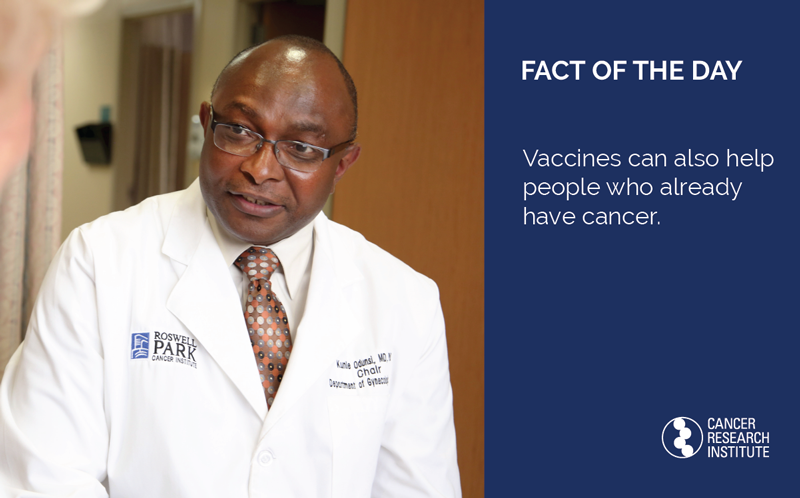
Vaccines can also help people who already have cancer.
Most people, when they hear the word vaccine, think about preventing diseases rather than treating diseases that people already have. In addition to vaccines that can help prevent cancer, more recently vaccines have been developed that can help treat patients who already have cancer. These work by helping the immune system learn what cancer “looks like.”
The first vaccine to be approved by the FDA was BCG (bacillus Calmette-Guerin)—which is actually a live, but weakened bacteria that was first used as a tuberculosis vaccine—for early-stage bladder cancer in 1990. (CRI’s Lloyd J. Old, M.D., was the first to show that BCG was effective against tumors in mice.)
More recently, the vaccine sipuleucel-T was approved for prostate cancer in 2010. Unlike BCG, which incidentally stimulates the immune system against cancer, sipuleucel-T is purposely designed to stimulate an immune response against cancer. The treatment involves first removing dendritic cells (DCs) from cancer patients and exposing them to a prostate cancer-specific antigen (known as prostatic acid phosphatase, or PAP), before putting them back into patients where they can hunt down and eliminate tumor cells.
Another newer approach pioneered by Kunle Odunsi, M.D., Ph.D., (pictured) has used a vaccine that targets the NY-ESO-1 protein and is associated with improved survival in patients with ovarian cancer that expresses NY-ESO-1.
Moving forward, scientists are focused on developing more personalized vaccines for patients, and these vaccines can be designed to target each patient’s individual mutations. To that end, the Cancer Research Institute, in collaboration with the Parker Institute for Cancer Immunotherapy, recently launched an initiative called TESLA that aims to refine an approach for making personalized vaccines for individual patients.
In addition to TESLA, the following CRI-funded scientists are also working on ways to improve the effectiveness of vaccines for cancer patients:
- Nina Bhardwaj, M.D., Ph.D.
- Sacha Gnjatic, Ph.D.
- Gavin Peter Dunn, M.D., Ph.D.
- Matthew Gubin, Ph.D.
- Marc Joseph Lajoie, Ph.D.
- Ferry A. Ossendorp, Ph.D.
- Craig L. Slingluff Jr., M.D.
- Jamal Zweit, Ph.D.
Image credit: Cancer Research Institute